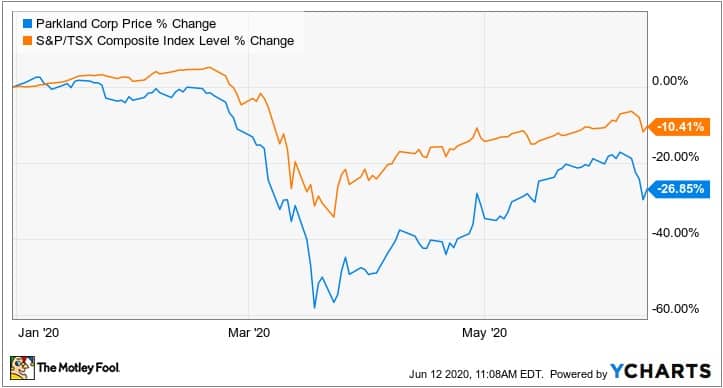Canadian energy stocks took a beating during the March 2020 stock market crash. A combination of an oil price collapse and poor economic outlook triggered by the coronavirus pandemic applied considerable pressure to their outlook.
It was no different for refiner and petroleum products distributor Parkland Fuels (TSX:PKI). The company, despite the strong rebound in stocks, is still down 27% for the year to date, or almost triple the S&P/TSX Composite’s 10%.

While markets remain choppy and the economic outlook is poor, this has created an opportunity to acquire Parkland at an extremely attractive valuation.
Weaker demand hits energy stock earnings
The sharp decline in economic activity failed to have a significant impact on Parkland’s first-quarter 2020 performance. Sales and operating revenue grew 3% year over year, while adjusted gross profit was only 15% lower.
Parkland’s quarterly adjusted EBITDA of $191 million was 39% lower than for the equivalent period in 2019. That saw the company report a $79 million net loss compared to a $77 profit a year earlier.
A large portion of EBITDA’s decline can be attributed to the Burnaby refinery turnaround, which had a $104 million impact. The oil price collapse, which occurred during the quarter, and the emergence of the coronavirus pandemic negatively affected margins. The net loss was primarily caused by a valuation and foreign exchange losses.
Parkland’s second-quarter earnings will be worse because of the impact of coronavirus on the economy, leading to a marked decline in demand for fuels and petroleum products. That will be offset, however, by the Burnaby refinery operating at full capacity after the successful completion of its turnaround.
Inelastic demand helps energy stocks
Parkland is also ideally positioned to weather the coronavirus pandemic because of recent moves made to bolster liquidity and strengthen its financial position. It amended its credit agreement, adding a further $300 million and boosting its cash holding at the end of March 2020 to $1.2 billion.
Importantly, the facility doesn’t mature until January 2023, giving Parkland considerable breathing space to emerge from the crisis and generate sufficient funding to repay the loan.
Parkland was also able to renegotiate the financial covenant on its credit facility. The total funded debt to credit facility EBITDA multiple was increased to six times, or more than double the 2.9 times reported for the first quarter, until the third quarter 2021.
That gives Parkland further breathing space, while enhancing its financial flexibility in the current harsh operating environment.
Parkland’s ability to survive the current economic crisis is enhanced by the relatively inelastic demand for fuels and other petroleum products.
Dividend can be maintained
By strengthening its financial position, Parkland has improved the sustainability of its regular monthly dividend. As of the end of March 2020, Parkland had a trailing 12-month payout ratio of 79%, and that could rise to over 100% if net income declines further, which is likely.
By boosting its considerable liquidity Parkland can sustain the payment for the short term, even as its losses widen because of weaker demand for fuels. Nevertheless, if the economic slump continues for a prolonged period, Parkland could be forced to cut the payment to protect cash flow and its balance sheet.
Foolish takeaway
Parkland is very attractively valued and will pull through the existing difficult operating environment in good shape. Its earnings will grow at a solid clip once the economy improves and the pandemic comes to an end. While waiting for that to occur, if you buy today, you will be rewarded by a monthly dividend yielding a juicy 3.6%.
 2-for1 Sale
2-for1 Sale







